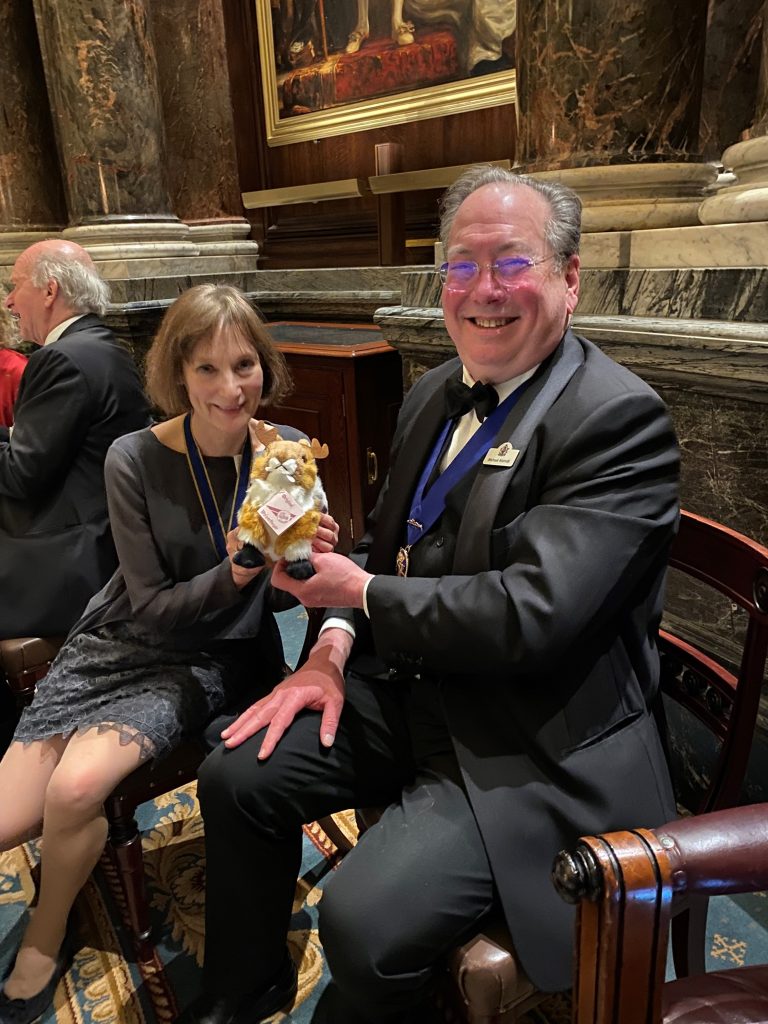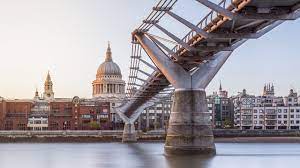Remarks to: Future Past Masters’ Associations (sic) 21-22 & 22-23 by Alderman Professor Michael Mainelli, Drapers’ Hall
President, Aldermen, Masters, Future Masters, Ladies & Gentlemen,
It is an honour to be asked by this evening’s mastermind, Erica Stary, to address such an extensive group of future Past Masters’ Associations here in the finest ward of the City of London, in the very hall where I decided to become a liveryman of the World Traders. Perhaps we should call this the Masters’ Open.
I’m privileged to be in three past Masters’ Associations myself, the Spitfires of 2018, the Zoomers of 2020, and the Unmuteables of 2021 [and now a fourth, the Domini XXIV].
We all know the school test nightmare. You have a test coming up in five minutes in a course for which you never registered, arrgh. Though we’ve long left school or university, in a Master’s year this nightmare clings and mutates; you have a livery speech in five minutes and you haven’t written it, arrgh. The fantastic thing about being a late Sheriff with three Past Masters Associations is the nightmare reaches its full horror, you have a speech to 110 liveries in five minutes and you haven’t written it, arrgh!
I’m privileged to be in ten wonderful livery companies and three Past Masters’ Associations myself, the Spitfires of 2018, the Zoomers of 2020, and the Unmuteables of 2021.
We in 2021 still struggle with whether to spell Unmuteables with an ‘e’ or not. Some of you will know the Hollywood legend of a pointed encounter between the movie siren Jean Harlow and the sharp-tongued aristocrat Margot Asquith. Harlow attended a party given by Asquith. Jean presumptuously referred to Lady Asquith by her first name, repeatedly mispronouncing it as “Margott”. Eventually, Lady Asquith could take no more, “No, no, Jean. The ‘t’ is silent, as in Harlow.” I guess the answer must be that the ‘e’ in Unmuteables is silent, like the ‘t’ in Hyacinth Bucket (sic).
Chris Hayward and I stepped down four months back after being the first Sheriffs to serve two consecutive years since 1228 AD. When you step down, people throw around uncomfortable adjectives, like ‘late’. I contend that we’re not late Sheriffs, we’re just very very tardy boys. Especially when preparing after-dinner remarks. What to say to such a gathering as tonight?
Elisabeth and I have a deep affection for the Thames, having owned and operated a commercial sailing barge, Lady Daphne, over two decades. Elisabeth sends her apologies and best wishes to you as she’s co-hosting a Thames 21 fundraising event tonight. An event that Sir Alan Yarrow and the Fishmongers have kindly supported. Elisabeth, I, and Lady Daphne raised Tower Bridge over 1,500 times, so I thought I might take bridges as my theme this evening.
When I was younger and in a different country, if somebody swallowed a tall tale we used to say, “and if you believe that, then I have a bridge to sell you”. We meant the Brooklyn Bridge, so I love the urban myth that John Rennie’s London Bridge of 1825 was sold as Tower Bridge to a gullible American in Arizona, however false that myth is.
The Thames is the most accessible tidal river in Europe, so much so that London was a city of sustainable transport feeding well over two million people before the age of steam hit London with the London & Greenwich Railway of 1838. As late as 1903 a Joint Select Committee of the Lords and Commons estimated that 75% to 80% of the whole traffic of London was carried by barges. But what makes London wealthy is not a river, but a river with a bridge. London Bridge dominated history from the time of the Romans to the founding of City Bridge Trust in 1282, up until that second upstart crossing at Westminster in 1750. The bridge.com boom since 1750 leaves the City with five bridges, Tower, London, Southwark, Blackfriars, and the Millennium Bridge.
We still see the importance of bridges today – the excitement and chaos that fantasy political proposals arouse, or the misery and chaos that poor maintenance inflict out west.
Geopolitics and geoeconomics are changing London’s role in the world. Brexit and Covid too. Covid reduced business travel over 70%, so many people missed a deeper trend. In Scandinavia, in the boom year of 2019, flygskam, ‘flight shaming’, reduced business travel by about an unprecedented 8% drop. Minimum estimates are that working from home will reduce commuting permanently by at least 20%. Average estimates are reductions of about 28%. London’s future depends on building new air bridges and telecommunications bridges abroad, and here the livery have a major role to play.
All cities need supporters, and in no city I know does an incoming Lord Mayor start with a booster crowd of 50,000 people in a thriving livery movement directed at commerce, community, and charity. When Covid hit, our hosts tonight, the Drapers, led a large number of livery companies in the Livery Kitchen Initiative, supporting the workers in the NHS with proper meals when they most needed them.
We could praise other livery initiatives all evening, but I’d like to set out three areas for we livery to explore further – inward, outward, and upward. On inward, the livery were already hosting business delegations from overseas, such as the Constructors hosting the city of Rugao just before lockdown. We should seek to increase these events markedly, volunteering to the Corporation and the Department for International Trade; Brazilian aerospace firms hosted by the Fanmakers, German chemical industries by the Salters, Indian pharmaceuticals by the Apothecaries.
Outward, one example is the Clothworkers, who support textile entrepreneurs when they wish to exhibit abroad. The 15-strong Financial Services Group of Livery Companies – Marketors, Chartered Secretaries, Actuaries, Chartered Surveyors, Chartered Accountants, Insurers, Arbitrators, Information Technologists, Solicitors, World Traders, Management Consultants, International Bankers, Tax Advisers, Entrepreneurs, and Guild Of Investment Managers – sponsors successful, hard-talking business trips, for example to five Chinese cities in 2019. These trips build deep friendships, such that the province of Shaanxi and the city of Xi’an sent a terracotta warrior as a present to me during my first year as Sheriff. We livery should add more business dimensions to all our overseas visits.
Upward – through joint networking. The livery made great strides moving events and content strongly online during Covid. We can go further, rapidly, with more joint events for international liverymen in cities abroad, receptions for international liverymen during Lord Mayors’ travels, overseas inter-livery networking via social media, promoting the Freedom and livery to frequent business travellers and international students, jointly recruiting more youth and diversity into the livery, perhaps even a worldwide Proud To Be A Freeman day. Our Northern members already have a Brigantes club. Consider building together an international livery support movement, an International Brigantes or Brigade or Bridges if you will. Dare I say, yesterday London, today the nation, tomorrow the world.
I love classical musician David Russell’s observation that “The hardest thing in life to learn is which bridge to cross and which to burn.” Taking advice from St Francis, I might add “and the wisdom to know the difference”. The City of London is about continuity and change, conducting our rituals while seeking to renew our relevance. London will cross, or burn, some big bridges ahead. We must grab a vastly larger share of a shrinking global market, the need for physical interaction essential to cross-border trade and cross-border investment. As Masters it is your duty to lead your companies in supporting London as the pre-eminent global business coffeehouse.
I know you will rise to that challenge, but now may I ask you to rise and drink a toast to: “The Masters Groups, root and branch, may they flourish forever”.
[This Past Masters’ Association went on to become The Platinums]
Samuel Rodenhizer links Russell’s observation with St Francis’s Serenity Prayer, that God would grant us the serenity to accept the things we cannot change and the courage to change the things we can. “These are the two bridges. The things we can change are the bridges we must cross. The things we cannot change are the bridges we must burn. Knowing which bridge to cross and which bridge to burn is the hard part. That’s why St Francis ended the prayer with … and the wisdom to know the difference.”
“The hardest thing in life is to know which bridge to cross and which to burn.” (David Russell)
[At the end, our most considerate host, Erica Stary, so kindly fulfilled some of my Christmas dreams with a most excellent February stocking stuffer, a Wolpertinger]


